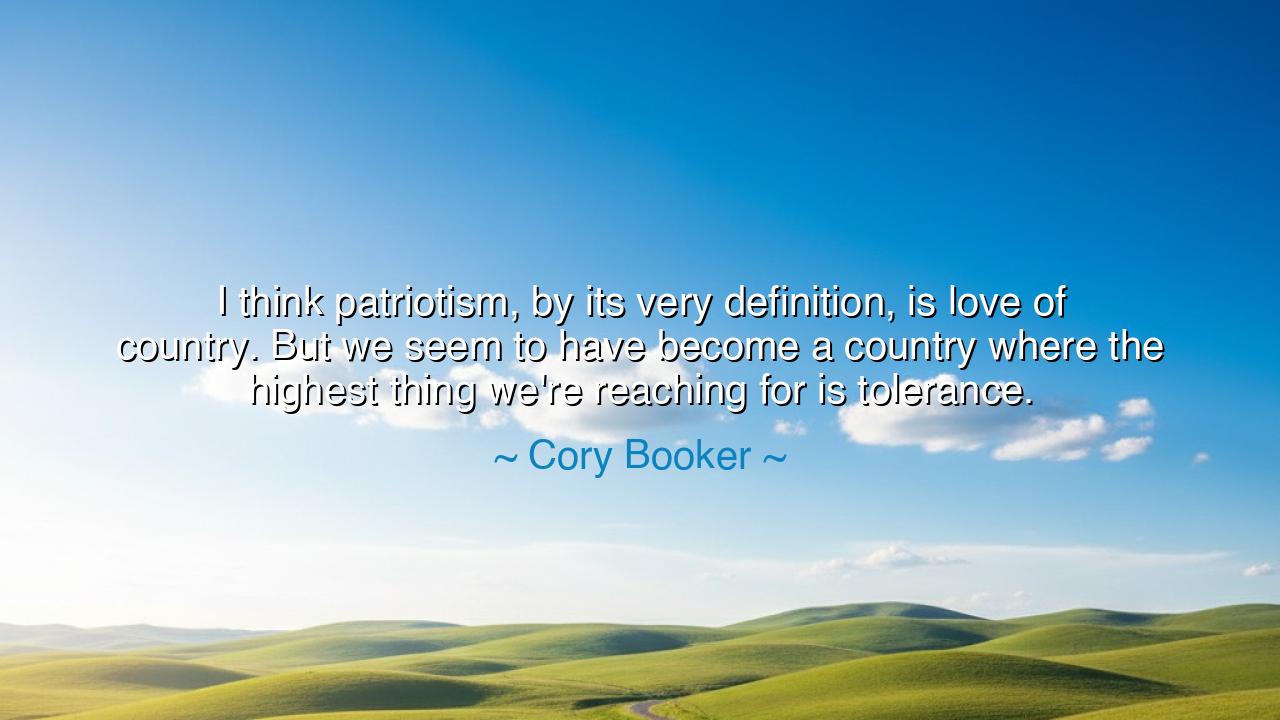
I think patriotism, by its very definition, is love of country.
I think patriotism, by its very definition, is love of country. But we seem to have become a country where the highest thing we're reaching for is tolerance.






Hear, O sons and daughters of the republic, the words of Cory Booker: “I think patriotism, by its very definition, is love of country. But we seem to have become a country where the highest thing we're reaching for is tolerance.” These words pierce like an arrow through complacency, for they remind us that patriotism is not merely the cold acceptance of one another, nor the bare minimum of coexistence. It is a fire, a devotion, a love that binds people to their land and to one another. To reduce this sacred bond to mere tolerance is to forget the fullness of what love demands.
The origin of this saying lies in Booker’s calling as a public servant, where he has witnessed both the fractures and the possibilities of his nation. He saw a culture that too often congratulates itself for simple forbearance—enduring differences without embracing them, coexisting without lifting one another. In his words lies a warning: when patriotism is reduced to tolerance, it is stripped of passion, stripped of sacrifice, stripped of the higher calling of unity. A nation cannot thrive on tolerance alone; it must be rooted in love, for love inspires not only patience, but also action, service, and courage.
Consider the tale of the American Civil Rights Movement. If its leaders had settled for mere tolerance, they might have been content with a quiet seat in the back of the bus, a muted place in society, a second-class citizenship endured without complaint. But men like Martin Luther King, Jr. and women like Rosa Parks demanded more than tolerance—they demanded love, equality, dignity, and justice. Their patriotism was fierce, not because it sought to destroy their country, but because it sought to fulfill its highest ideals. They loved their land enough to demand that it live up to its creed.
So too in the history of India’s freedom struggle, Mahatma Gandhi did not seek mere tolerance of his people by the British crown. He sought freedom rooted in dignity, in the recognition of the full humanity of his nation. Patriotism, for him, was not content with being endured; it longed for love, respect, and self-rule. His life teaches us that tolerance is only the beginning, but it is love—the essence of patriotism—that fuels transformation.
The meaning of Booker’s words is profound: tolerance is not enough to sustain a nation. It asks too little of the heart. Tolerance can coexist with apathy, even with resentment. One can tolerate a neighbor without ever embracing them, without ever sacrificing for them. But patriotism, rightly understood, demands love—a love that builds bridges, that seeks justice, that works to heal the wounds of the nation. Love is stronger than tolerance, for it binds where tolerance merely permits.
The lesson is clear: do not settle for the comfort of tolerating one another. Rise higher. Love your country not only in its beauty, but in its brokenness. Love your fellow citizens not only in agreement, but even in difference. Love does not mean blindness to flaws, but the courage to address them, the willingness to sacrifice for a greater whole. True patriotism is not the waving of flags without thought, nor the silent endurance of one another—it is the unyielding commitment to lift a nation toward its highest promise.
Practical counsel follows. Seek opportunities not just to tolerate, but to serve. Listen to those unlike you, not with cold patience, but with compassion. Act in your communities with the fire of love, not the indifference of endurance. When you speak of your country, let your words not be empty flattery, but acts of devotion—holding it accountable, celebrating its virtues, healing its faults. In this way, your patriotism will be love in action, and your nation will be stronger for it.
So let Cory Booker’s words echo within you: “Patriotism… is love of country. But we seem to have become a country where the highest thing we’re reaching for is tolerance.” Take this as a summons to rise higher, to love more deeply, to serve more fully. For tolerance may allow a nation to exist, but only love will cause it to flourish. And when love of country burns bright in the hearts of its people, no darkness, no division, no despair can overcome it.






AAdministratorAdministrator
Welcome, honored guests. Please leave a comment, we will respond soon